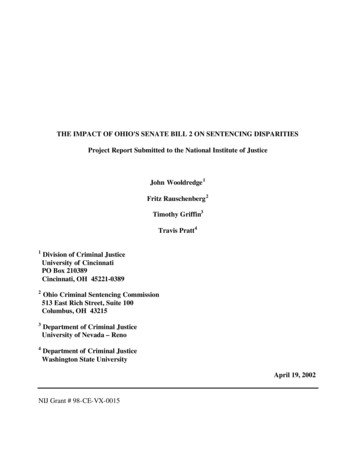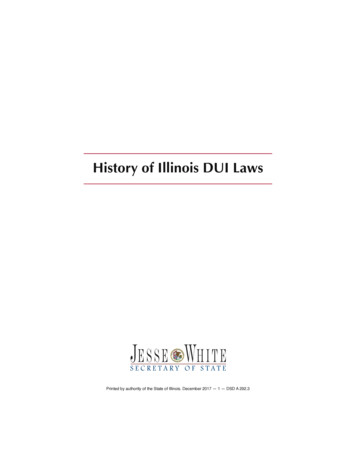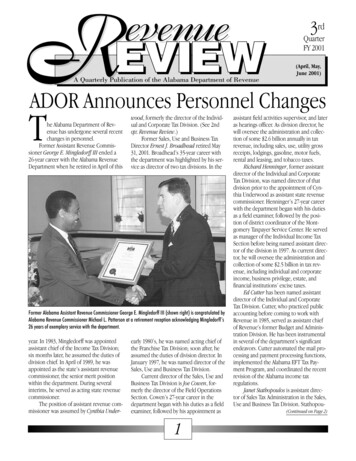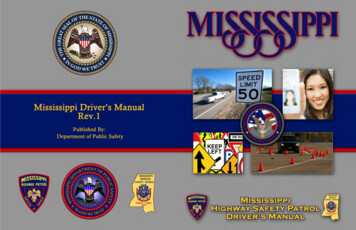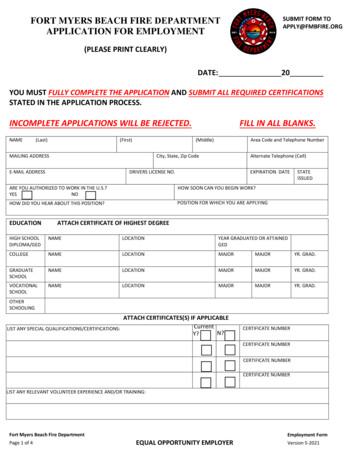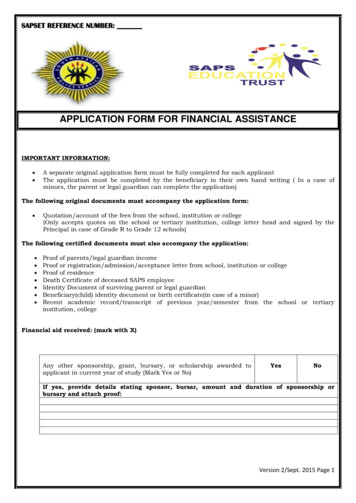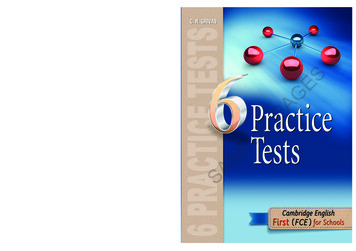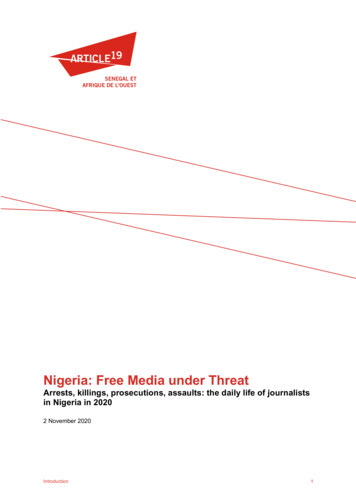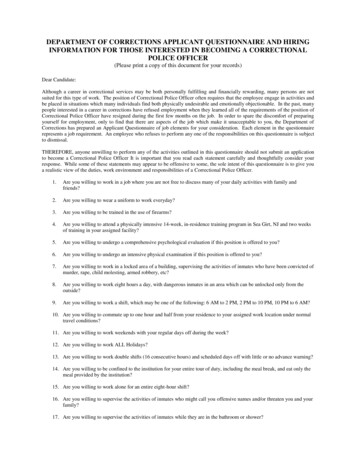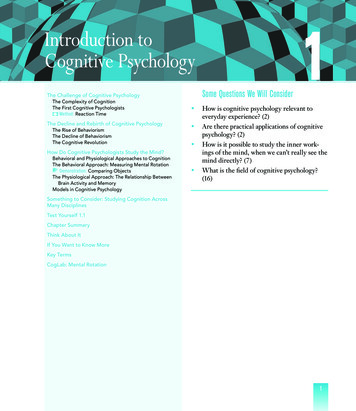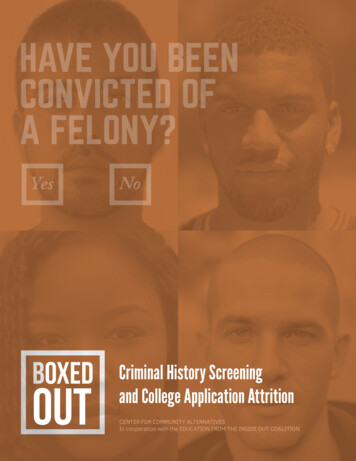
Transcription
HAVE YOU BEENCONVICTED OFA FELONY?YesNoCriminal History Screeningand College Application AttritionCENTER FOR COMMUNITY ALTERNATIVESIn cooperation with the EDUCATION FROM THE INSIDE OUT COALITION
March 2015, Boxed Out: Criminal History Screening and CollegeApplication Attrition by Center for Community Alternatives islicensed under a Creative Commons Attribution-NonCommercialNoDerivatives 4.0 International License.Photo creditsCover (clockwise from top/left): 2009 batabidd via Flickr 2011 Parker Knight via Flickr 2009 julien haler via Flickr 2008 Luigi Morante via FlickrPage 16: 2013 COD Newsroom via FlickrPage 38: 2006 manuel MC via FlickrOwn work. Licensed under CC BY-SA 2.0via Wikimedia CommonsContents page/Page 2:“SUNYAdminBuildingAlbany” byUpstateNYer - Own work. Licensed underCC BY-SA 3.0 via Wikimedia CommonsDesign creditEcho / echomakes.com
About the Center for CommunityAlternatives (CCA)The Center for Community Alternatives (CCA) isa community-based nonproft organization thatpromotes reintegrative justice and a reducedreliance on incarceration. Founded in 1981, CCAengages in research, policy advocacy, and directservices in pursuit of our goals to end masscriminalization and incarceration, eliminate racialdisparities, and eradicate barriers to employment,housing, higher education, and civic participationexperienced by people with criminal records. CCAdefnes our work within a civil and human rightsframework, based on our understanding that thecriminal justice system in the United States hasbecome a mechanism to erode fundamental rightsin this broad array of social domains. Our researchand policy advocacy is grounded in our directwork with people directly impacted by the criminaland juvenile justice systems that now include theschool-to-prison pipeline.This report was written by CCA staff: AlanRosenthal, Esq., Advisor on Special Projects andCounsel; Emily NaPier, M.A., Senior ResearchAssociate; Patricia Warth, Esq., Director of JusticeStrategies; and Marsha Weissman, Ph.D.,Executive Director.About the Education From The InsideOut Coalition (EIO)The Education from the Inside Out Coalition (EIO)led by the College and Community Fellowship,JustLeadershipUSA, and the Center for CommunityAlternatives is a national, nonpartisan collaborativeof advocates working to remove barriers tohigher education faced by students with criminalconvictions while in prison and in the community.EIO is made up of members and supporters acrossthe country. EIO works with federal, state andlocal government offcials, along with educationalinstitutions, providing technical assistance andother support.
ACKNOWLEDGMENTSWe would like to frst acknowledge the generosity ofthe people who were willing to share the stories oftheir struggles to achieve their dreams of a collegeeducation. These experiences inspired our work.This research was enriched by our participation inthe Education from the Inside Out Coalition that isfocused on removing barriers to higher education forpeople with criminal records, including incarceratedpeople. Glenn Martin, Vivian Nixon, Mel Gregarin,Dionna King, and Erica Murphy provided invaluableguidance, leadership and feedback. Thanks toMelissa DiRado and Sara Wolkendorfer, SyracuseUniversity College of Law summer externs, for theirwork on the FOIL requests and especially to Melissafor her perseverance to volunteer her time beyondher externship to see this project through to itsconclusion. Roz NaPier and Jim Vermeulen helped inthe proofreading of the report.The Center for Community Alternatives is gratefulto the Herb Block Foundation for its support ofthis project.
TABLE OF CONTENTSiiv1571621PREFACEEXECUTIVE SUMMARYI. INTRODUCTION43Economic BenefitsPublic Safety BenefitsBenefits to Civic ParticipationII. METHODOLOGYIII. FINDINGSOverview of Application ProcessFindings: Application Attrition RatesFindings: Rejection RatesFindings: Racial ImpactIV. BOXED OUT: STIGMA AND EXCLUSIONV. THE GAUNTLET OF SUPPLEMENTALREQUIREMENTSTen Most Problematic ObstaclesDenial by Application Attrition37VI. CAMPUS SAFETY AND CRIMINALHISTORY SCREENING40VII. MASS CRIMINALIZATION ANDRACIAL DISPARITIESThe Wide Net of the Criminal Justice SystemThe Impact of the Criminal Justice System onPeople of ColorVIII. ACCESS TO HIGHER EDUCATIONAND POLICY IMPLICATIONS4955556475767882IX. CONCLUSION AND RECOMMENDATIONSSummary x A: Methodology and Sample FOIL Request LettersAppendix B: Policy Documents Used by SUNY CentralAppendix C: List of Documents Requested by SUNY CampusesAppendix D: Sample Releases Required by SUNY CampusesAppendix E: The Fair Access to Education ActREFERENCES
PREFACEWith this study and report we build upon whatwas revealed in our 2010 study, The Use ofCriminal History Records in College AdmissionsReconsidered. The Reconsidered studyilluminated that a growing number of collegesand universities are asking about criminal historyinformation during the application process:two-thirds of the colleges and universities wesurveyed reported that they do so. Yet, as wediscussed in the Reconsidered study, there is noempirical evidence to indicate that criminal historyscreening makes college campuses any safer. there is no empirical evidenceto indicate that criminal historyscreening makes collegecampuses any safer.i
This study helps to explain how the use of thecriminal history box on college applications andthe supplemental requirements and proceduresthat follow create barriers to higher educationfor otherwise qualifed applicants. In this study,which focuses on the State University of NewYork (SUNY), we found that almost two out ofevery three applicants who disclosed a felonyconviction were denied access to higher education,not because of a purposeful denial of theirapplication but because they were driven out ofthe application process. We term this phenomenon“felony application attrition” which describes thereduction from the number of applicants whostart an application and check the felony box“yes” to the number of applicants who, accordingto the admissions offce, have satisfed all ofthe supplemental requirements and completedtheir applications. In this study, we explore howthe stigmatizing and daunting impact of thesupplemental procedures imposed on applicantswho disclose a felony conviction contribute to thisattrition.Revealing this insidious and unnecessary lifetimeconsequence is the frst step toward addressingit. We share the information from our researchin the sincere hope of raising awareness of andopening up a dialogue about the dangers ofcollege admissions policies that intentionallyor inadvertently drive people with past criminaljustice involvement from the college applicationprocess. We urge colleges and universities torefrain from asking about and considering criminalhistory information in admissions decision-making.This case study of SUNY has national implications.The supplemental procedures and requirementsimposed by SUNY campuses are not unique.From our 2010 study we know that 55 percent ofthe public colleges that responded to our surveyengage in criminal history screening, and amajority of those use supplemental proceduresand requirements.Federal, state and local public policy-makers arepromoting reentry and reintegration efforts as ameans of addressing our nation’s four-decade longfawed criminal justice policies that have producedovercriminalization and mass incarceration.Such efforts, if successful, will improve societyin many respects, including reducing povertyand decreasing the racial divide. At the sametime, many colleges and universities are bothconsciously and unconsciously engaged in apractice that subverts those public policy effortsand undermines development of good citizenship,public safety, democracy, the human right toeducation, and expands the economic and racialdivide. It is both unrealistic and disingenuous toexpect people who have served their sentenceafter a criminal conviction to live law-abiding andproductive lives if they are continuously deniedemployment and educational opportunities.ii
“I had often experienced the box onemployment applications. I hadpainfully learned what the boxmeant when I was rejected from onejob after another. When I saw thebox on a college application I had asinking feeling. Once I received thesupplemental request for documentsand information about my convictionI became convinced that this was thesame old box with the same old purpose.”Randy *
EXECUTIVE SUMMARYRandy’s experience applying to the StateUniversity of New York is one of stigma anddiscouragement. It was repeated by many ofthe individuals we interviewed for this studywho hoped to attend a SUNY college butfaced daunting, if not impossible, applicationrequirements imposed on people with past felonyconvictions. Encountering the felony convictionquestion on the initial SUNY application isdispiriting, but even for those who get past theinitial stigmatizing question, the supplementaldocuments and information required by SUNYcampuses are so discouraging and onerous thatmany people are driven out of the applicationprocess. While the supplemental process is notuniform across the SUNY system, every campusasks the felony conviction question and thenfurther scrutinizes the backgrounds of applicantswho disclose a felony.This study was prompted by the narratives ofindividuals directly impacted by SUNY’s inquiriesabout criminal history records – stories fromindividuals with past criminal justice systeminvolvement who found it diffcult to navigate theSUNY application process. As an organizationthat provides services to help justice systeminvolved individuals successfully reintegrateinto the community, staff at the Center forCommunity Alternatives (CCA) are often askedto help individuals overcome the myriad lifetimeconsequences that hamper access to jobs andhousing. The experience of a client referredto CCA for assistance with applying to collegeraised our concern and focused our attention onthe use of criminal history records in the collegeadmissions process. As a result, we joined theleadership of the Education from the Inside OutCoalition (EIO). The College and CommunityFellowship (CCF), JustLeadershipUSA (JLUSA),and CCA are the lead agencies in the nationalCoalition, which works to increase access tohigher education for currently and formerlyincarcerated people.understanding the impact on would-be collegestudents is critically important. Using datacollected from SUNY campuses, we analyzed howthese policies and procedures affect applicantbehavior. We focused primarily on whetherasking questions about criminal convictionsinhibits application completion, thereby creatinga mechanism, intentionally or unintentionally, thatserves to exclude applicants with criminal justicesystem involvement.All SUNY applications include a question aboutfelony convictions despite the fact that thereis no evidence that criminal history screeningmakes college campuses safer. Applicantswho check “yes” indicating that they do havea felony conviction receive a follow-up letterasking for supplemental information related totheir conviction and notifying them of additionalprocedures. Applicants are also informed bySUNY colleges that their application will not beconsidered complete and thus, no action will betaken on their application, unless all the additionalinformation is provided.We found a signifcant drop-off from the numberof applicants who start an application andcheck the box disclosing a felony convictionand the number who submit an applicationthat is considered complete by the admissionsoffces across SUNY campuses. We call this“felony application attrition” and found that thisphenomenon, more than explicit rejection on thebasis of a felony conviction, closes doors to highereducation for people with criminal history records.This report examines screening policies,procedures, and practices used by SUNY forapplicants who disclose that they have felonyconvictions. As criminal history screening bycolleges and universities has become increasinglycommon in the college admissions process,* Several of the individuals interviewed for this report requested anonymity. We indicate the use of pseudonyms with an asterisk.iv
KEY FINDINGS12vAsking applicants about past felonyconvictions has a chilling effect,discouraging people from completing theapplication process. The supplementalapplication processes at SUNY campusesfor people disclosing felony convictionscan be characterized as an experienceof running a gauntlet, with applicantswho check the felony box “yes” subjectto far-reaching, multiple requestsfor information, some of which areimpossible to provide.aWe estimate that each year2,924 applicants to SUNY checkthe box disclosing a felonyconviction. Of those, 1,828 donot complete the application.bThis means almost two outof every three applicants whocheck “yes” to the felonyconviction question do notcomplete the applicationprocess and are neverconsidered for admission.The application attrition rates forindividuals who check “yes” to thefelony conviction question on the SUNYapplication are signifcantly higher thanthe application attrition rates for thegeneral applicant population.aThe median felony applicationattrition rate of 62.5 percentis three times higher than themedian general applicationattrition rate of 21 percent.bTwo-thirds of the SUNYschools included in the studyreport felony applicationattrition rates over 50 percent.In contrast, the generalapplication attrition rateis under 50 percent at allcampuses included.
3aFelony application attrition is a more formidablebarrier to admission at SUNY campuses thanrejection based upon a felony conviction.Felony application attritionrates are higher than felonyrejection rates: 90 percentof SUNY schools includedin this study reported felonyapplication attrition rates thatare higher than their felonyrejection rates.4bFor two-thirds of theseschools, the felonyapplication attrition rateis more than 10 timeshigher than the felonyrejection rate.CFor every one applicant deniedadmission because of a felonyconviction, 15 such applicantsare denied admission becauseof application attrition.The data suggest that criminal history screening policies andprocedures have a disparate impact on African Americanapplicants, particularly at the community college level.Screening for criminal records undermines SUNY’sfundamental goal to ensure the broadest possibleaccess to all segments of the population regardlessof their ability to pay, race, gender or ethnicity.vi
RecommendationsBased on our findings, the Center forCommunity Alternatives, in concert withthe Education from the Inside Out Coalition,strongly recommends that the StateUniversity of New York and all collegesand universities refrain from including thecriminal history question on the applicationand prohibit the use of criminal historyinformation in admissions decision making.Additionally, we support the enactment of state lawssuch as the proposed New York Fair Access to EducationAct, S.00969 and A.03363 (2015-2016 session) thateffectively bans the box from the admissions applicationsand prohibits institutions of higher education, both publicand private, from using criminal history information foradmissions decisions or to rescind an offer of admission.vii
“If we are sincere about criminal justicereform, economic independence, creatingpathways out of poverty, and reducingour reliance on incarceration, then thecollege doors should be open to all. Wecan create more thoughtful and inclusiveadmissions policies, but we need to startby thinking outside the box.”Ronald Day
I. INTRODUCTIONThe mission of the state university system shall beto provide to the people of New York educationalservices of the highest quality, with the broadestpossible access, fully representative of all segmentsof the population in a complete range of academic,professional and vocational postsecondary programsincluding such additional activities in pursuit of theseobjectives as are necessary or customary.This sentence opens the mission statement of theState University of New York (SUNY) and refectsits founding principles.SUNY was formally established in 1948 followingrecommendations made by the TemporaryCommission on the Need for a State Universityappointed by Governor Thomas E. Dewey. Thecreation of a state system brought together 31distinct state-supported colleges that included11 teacher colleges, seven four-year colleges,11 community colleges, as well as land-grantinstitutions with a combined enrollment of almost30,000 students. The assumptions underlyingthe establishment of SUNY were staunchlyegalitarian. The 1948 Commission declared, “[H]igher education should be easily available to allwho are qualifed to proft from it. No humanresources should be lost through barriers of age,race, color, creed, or national origin. Neithershould the right to an education be contingent onability to pay for it” (Eurich 1950, 169-170).The creation of SUNY is part of a long Americantradition of support for public higher education.Beginning as early as 1789 with the NorthCarolina1 state university system, public orstate-sponsored universities were founded toensure equal opportunity for all students toattend college regardless of their backgroundor economic status (Bastedo & Gumport2003). SUNY itself was founded based on anappreciation of the public and economic beneftsassociated with higher education, a recognitionthat the cost of private colleges was out-of-reachfor many New Yorkers, and that higher educationplayed an important role in strengtheningcivic engagement and democratic institutions(Henderson & Cowan 1948; Eurich 1950). SUNYcommunity colleges were expected to be mostaccessible as students would be able to remain intheir home communities and avoid the additionalexpenses of room and board.Unfortunately, SUNY admission policies andpractices for people with felony convictionsnow undermine its founding principles. Suchindividuals are a sizeable portion of New YorkState’s population, and they are fnding it diffcultto access the State’s public higher educationsystem. This report describes the SUNY policiesand procedures and presents data that documentthat the current policies discourage people withfelony convictions from completing applicationsand thus prevent them from being admitted to aSUNY school.1. The University of Georgia also claims to be the frst public university as it was state-chartered in 1785; however, the University of NorthCarolina was the frst state system opened to the public.1
All SUNY applications require applicantsto disclose whether they have any priorfelony convictions. Those who check the boxindicating that they do are then required tocomplete varying supplemental proceduresand provide additional documents andinformation in order to be considered foradmission. As our data analysis shows, asignifcant number of applicants who startan application and check the box disclosinga felony conviction never complete theapplication. We call this phenomenon“felony application attrition.”This study was prompted by the narrativesof individuals directly impacted by SUNY’sscrutiny of criminal history records – storiesfrom individuals with past criminal justicesystem involvement who found it diffcultto navigate the SUNY application process.As an organization that provides servicesto help justice system-involved individualssuccessfully reintegrate into the community,staff at the Center for CommunityAlternatives (CCA) are often asked to helpindividuals overcome the myriad lifetimeconsequences2 that hamper access to jobsand housing. We were less familiar withbarriers to higher education until 2006when a client was referred to CCA3 for helpin applying to a SUNY campus, HerkimerCounty Community College. At the time, HerkimerCounty Community College’s written policy statedthat admission would be denied to any applicantwith a prior felony conviction who did not residein Herkimer County.4 This raised our concernand focused our attention on the use of criminalhistory records in the college admissions process.As a result, we joined with the Education fromthe Inside Out Coalition (EIO). The College andCommunity Fellowship (CCF), JustLeadershipUSA(JLUSA), and CCA are the lead agencies in thisnational Coalition, which works to increase accessto higher education for currently and formerlyincarcerated people.To examine this issue, CCA frst looked at thenational trends in college admission screening ofcriminal history records. In 2009, we partneredwith the American Association of CollegeRegistrars and Admissions Offcials (AACRAO) toconduct a national survey to determine the extentto which the criminal history question was beingused on applications by colleges and universitiesto screen applicants (Center for CommunityAlternatives 2010). We found that 66 percent of thecolleges that responded to the survey collectedcriminal justice information on their applicants.We also learned that checking the box typicallyprompted the college to ask for supplementalinformation and subjected applicants to additionalscreening and inquiries. Follow-up interviewswith admissions offcers alerted us to the fact that2. For years, courts across this nation have clung to the legal fction that there is a distinction between “direct” consequences of a criminalconviction (that is, the punishment pronounced in court), and “collateral” consequences (that is, the life-altering punishment that is notdiscussed in court). This legal fction has been fostered to prevent people from withdrawing their pleas after being confronted with a punishmentfor their conviction of which they were not aware when they decided to plead guilty. In 2010, the United States Supreme Court rejected thislegal fction in Padilla v. Kentucky. Throughout this report, we too avoid using terminology that promotes this legal fction, instead using the term“lifelong consequences” as one that better refects the myriad punishments that fow from a criminal conviction.3. The client was referred by On Point for College, an organization founded in Syracuse to help frst-generation students get into college, staythere, and succeed afterwards.4. The college has since removed this policy.2
many applicants dropped out of the applicationprocess when confronted with supplementalrequests. One admissions director stated thatapplicants who disclose a criminal record areasked to submit their criminal history record(rap sheet), a letter from their parole offcer,and a personal essay, and noted that “a lot ofpeople drop out [of the application process] atthat point” (Center for Community Alternatives2010:14). He estimated that only about fveout of 30 prospective students who disclose acriminal history each year will move forward withtheir applications once additional informationis requested. Our participants told us much thesame story – that the criminal history box onthe application is dispiriting, but even whenthey get past the initial stigmatizing question,the supplemental documents and informationrequired are so discouraging and daunting toproduce that many abandon the applicationprocess.This study investigates how questions aboutcriminal histories impact the application andadmissions processes for people with suchrecords. Since SUNY is one of the nation’spremier public higher education systems, ourresearch on the State University of New Yorkserves as a case study of how questions andscreening dissuade applicants from completingthe application process. Screening for criminalrecords undermines SUNY’s foundational goalsto ensure access to quality higher education to allqualifed students regardless of their ability to pay,race, gender, or ethnicity. While criminal historyscreening may not be intended to discourageapplicants of color from applying or completingthe application process, racial disparities in thecriminal justice system, including that of New YorkState, serve as a de facto mechanism to excludepoor people of color from access to a collegeeducation.We examined the myriad policies that areemployed by the SUNY Central administrationand by individual campuses that deter people withcriminal histories from applying or completingthe application process. We analyzed data thatwe collected from each SUNY institution onapplication outcomes for prospective studentswith criminal histories. We frame our analysisand conclusions about the impact of criminalhistory screening within an understanding ofthe disparities in the criminal justice system andhow stigma – what Devah Pager (2003) has calledthe “mark of a criminal record” – discouragesapplicants from completing applications. Weconclude with our primary recommendation3that SUNY should remove the criminal historyquestion from their application and admissionsprocess.This recommendation is grounded in the personalnarratives that are interspersed throughout thisreport. The stories describe herculean effortsto enroll in college. Some individuals are stillstruggling to get through the SUNY process;others made it with the support of organizations,friends and family. Still others decided to forgoSUNY and enrolled in other colleges. VivianNixon’s story is one example of perseverance thatled to success.
Vivian NixonVivian Nixon served 3 ½ years in prison duringwhich time she became focused on educationand the opportunities it offered. When Viviancame home from prison she was a womanwith a purpose; mature, committed, and eagerto return to college. She applied to SUNY OldWestbury. She checked yes on the application boxindicating a felony conviction and wrote an essayabout her growth and development that resultedfrom her educational work experiences while inprison. Vivian was stunned when she was deniedadmission because of her felony conviction. Shewrote an impassioned letter to Calvin Butts, thePresident of Old Westbury, challenging the denialand awaited a response.Her rejection from Old Westbury did not deterVivian’s determination to go to college. Withthe start of the semester drawing near, Viviancould not wait for a response from Old Westburyand instead decided to re-enroll in Empire StateCollege, where she had been a student prior toher time in prison. As a former student, she wasnot required to re-apply and thus did not have todisclose her felony conviction.Well into her frst semester, Vivian received aletter from Dr. Butts informing her that he hadoverruled the admissions review committee andshe was accepted at Old Westbury. However,Vivian declined the offer, as she was alreadysuccessfully enrolled as a student at Empire StateCollege and also was employed. Vivian receivedsupport from the College and CommunityFellowship (CCF), an organization whose primarypurpose is to help formerly incarcerated womengain access to higher education. CCF’s supporthelped Vivian to excel as a student and earn adegree in human services administration.Upon graduation, Vivian was hired to serve asthe Executive Director of CCF. Over the years,Vivian has become a nationally recognized leader,advocating for educational opportunities for menand women in prison, and in the community uponrelease. She is the co-founder of the Educationfrom the Inside Out Coalition, a national, nonpartisan collaborative of advocates, educators,and people with prior criminal history records,working to remove barriers to higher educationboth during incarceration and in the community.Vivian is also an ordained local deacon in theAfrican Methodist Episcopal Church and currentlyserves as an associate minister at Mt. Zion AMECin New York City. She has received multiplehonors for her work including the John JayMedal for Justice, a Soros Justice Fellowship,an Ascend Fellowship at the Aspen Institute, aPeta Foundation Fellowship, the Hudson Link forHigher Education Brian Fischer Award, the CitizensAgainst Recidivism Mary McLeod BethuneAward, and the Correctional Association LiftingAs We Climb Award. She is currently a ColumbiaUniversity Community Scholar.While we celebrate the success of individuals suchas Vivian, this study indicates that many peoplenever make it through the admissions process.Vivian recognizes what we as a society lose by aprocess that pushes people away from pursuing acollege education:“Te ironies of my story are many,but they all point to one thing:screening college applicants forcriminal conviction historiesisn’t necessary and only servesto discourage and exclude someof the brightest and potentiallymost successful contributors toour society from gaining theeducation and credentials theyneed to open the doors to careersthat will lead to positions ofinfuence and leadership.”4
II. METHODOLOGY: APPROACH AND CHALLENGESTo examine the impact criminal history screening hason applicants with past convictions, we first looked atthe policies and procedures used by SUNY institutionsin their review of applicants who “check the box”acknowledging a prior felony conviction. We thencollected and analyzed data to see if those who checkthe box “yes” are less likely to complete the admissionsapplication than the general applicant population.Data CollectionWe relied on the New York State Freedom ofInformation Law (FOIL) (Public Offcers Law,Article 6, §§ 84-90) to collect both the policyinformation and the admissions data. FOILrequires that state agencies provide records anddata upon request.5 We opted to use FOIL tocollect data based on challenges we and others6encountered in trying to obtain this type ofinformation through voluntary disclosure.Our study revealed signifcant problems in theways that SUNY campuses collect and maintaindata that limit defnitive evaluation of the impactof criminal history screening. Problems includedmissing or incomplete data as well as inconsistentor contradictory data. The fndings in this report,while suggestive that asking questions aboutcriminal history discourages people with su
Alternatives (CCA) The Center for Community Alternatives (CCA) is a community-based nonproft organization that promotes reintegrative justice and a reduced reliance on incarceration. Founded in 1981, CCA engages in research, policy advocacy, and direct services in pursuit of our goals to end mass criminalization and incarceration, eliminate racial
